lawenforcement
Latest
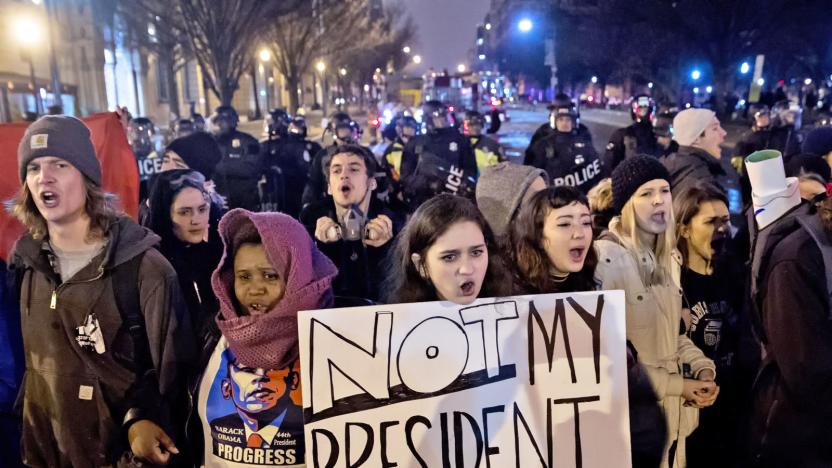
Facebook warns inauguration protesters over police data hunt
Protests on the day of President Trump's inauguration were mostly peaceful, but over 230 people were arrested on allegations of rioting... and law enforcement appears bent on scouring their internet profiles for evidence. CityLab has learned that Washington, DC police have been asking Facebook for user account information as part of their investigations. And in at least one case, Facebook warned one of the targets -- file a challenge to the data request or the company might have to comply within 10 days.
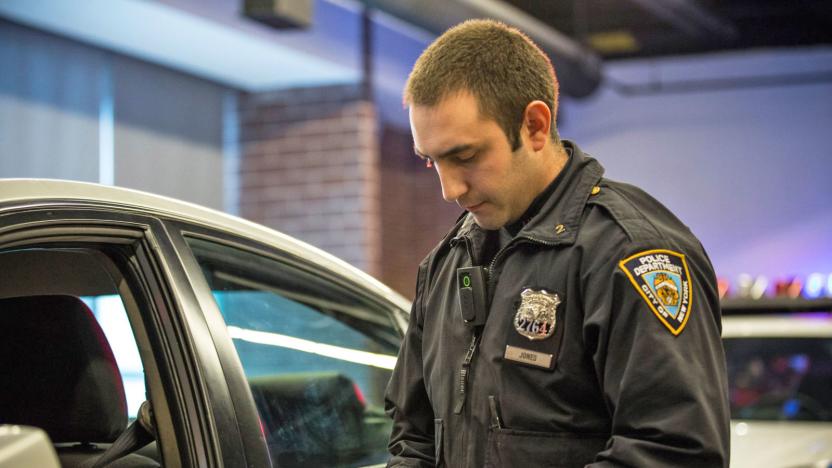
NYPD will equip all officers with body cameras by late 2019
New York City started trying police body cameras years ago, but it hasn't had a formal agreement to roll them out across the entire force. It's not for lack of trying, though -- the city and the officers' union have been locked in contract negotiations for ages. An agreement is finally in place, however. As part of a new contract, the NYPD will equip every officer with a body camera by the end of 2019. When there are over 34,000 officers patrolling the streets, this could easily be one of the most ambitious body camera projects to date.

Twitter discloses two far-reaching FBI data requests
Twitter is joining in the recent trend of tech companies disclosing FBI data requests after gag orders have lifted... and the news isn't exactly comforting. The social network has revealed that two National Security Letters sent in 2015 and 2016 asked the company for electronic communication transaction records that could include sensitive internet data. The company denied most of the demands, but the very nature of the requests is the problem -- they suggest that the FBI was pushing past the guidelines set by a 2008 Justice Department memo, which limited these orders to phone billing records.
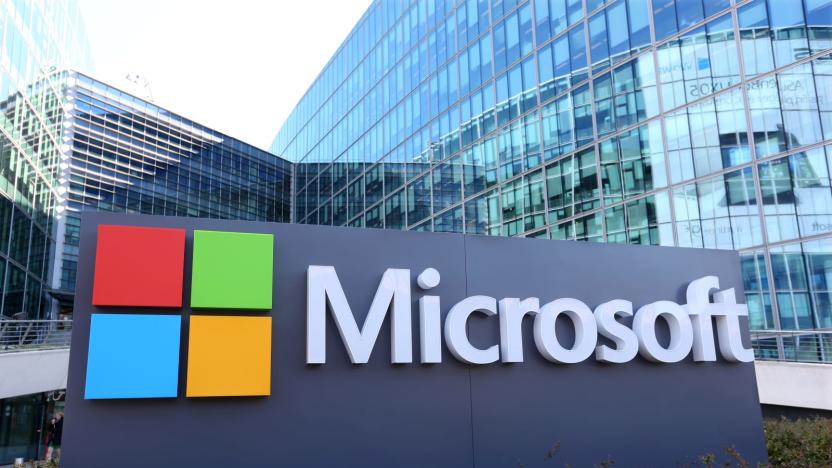
US law enforcement can't ask companies to turn over foreign data
Microsoft has fought a long battle to prevent American law enforcement from demanding overseas data, but it can rest easy... at least, for now. A stalemate in a federal appeals court has upheld a July 2016 ruling that judges can't issue warrants for data on servers located overseas. The court determined at the time that the Stored Communications Act didn't cover searches outside the US, shooting down an attempt by investigators in a drugs case to collect email from a Microsoft server in Ireland.

Facebook bans known protest-tracking tool for law enforcement
Facebook has blocked Media Sonar from accessing its data, according to Motherboard, a month after Twitter cut off its access. The Canadian company is known for selling social-media-monitoring tools to law enforcement agencies, who mostly used them to track activists of color and keywords such as "BlackLivesMatter" in the past. A Facebook spokesperson told the publication that it also banned the company from accessing its API last year. In addition, Facebook-owned Instagram banned Media Sonar from its platform for violating its terms of service.

Twitter won't share tweets with law enforcement data hubs
Twitter is still determined to avoid facilitating mass surveillance by spies and law enforcement. The company has told Dataminr, a firm it partly owns, to stop sharing tweets with the 77 law enforcement fusion centers (that is, data hubs where agencies share info and make connections) in the US. This doesn't prevent police from sifting through Twitter posts, but it certainly makes their work harder. The centers won't have ready access to "billions" of tweets they can pass on to the federal government for spying purposes, according to the ACLU.
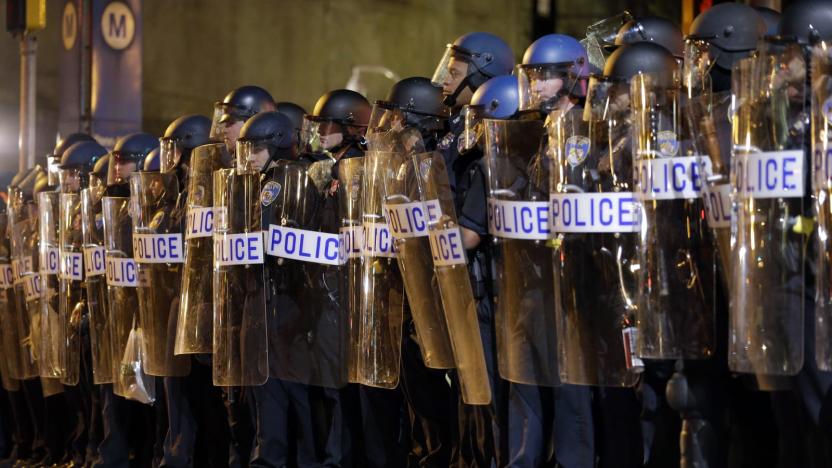
FBI using Twitter's raw 'firehose' data to monitor users
The FBI is using a Twitter tool called Dataminr to track criminals and terrorist groups, according to documents spotted by The Verge. In a contract document, the agency says Dataminr's Advanced Alerting Tool allows it "to search the complete Twitter firehose, in near real-time, using customizable filters." However, the practice seems to violate Twitter's developer agreement, which prohibits the use of its data feed for surveillance or spying purposes.

Canadian cops spied on journalist's phone for months
The Montreal police tapped the iPhone of a columnist writing for Canadian French-language newspaper La Presse, according to the publication itself. La Presse said it discovered 24 surveillance warrants granted by Montreal Judge Josée De Carufel giving the cops' special investigations unit the legal right to spy on Patrick Lagace's incoming and outgoing texts and calls. That's not all they did, though -- they also tracked his whereabouts through his iPhone's GPS.
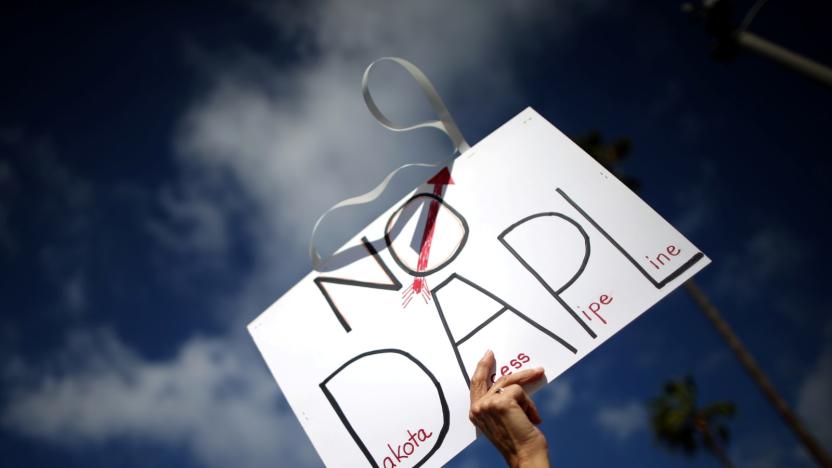
Your Facebook check-in won't help North Dakota protestors
There's a new viral message making its way through your Facebook friends' status updates today. The copy-paste chain letter message claims that police in Morton County, North Dakota are using Facebook check-ins to target demonstrators and disrupt protests of the Dakota Access Pipeline, while also calling on everyone to check in at the location "to overwhelm and confuse" law enforcement officials. Unfortunately for everyone at home, the rumor is false and status-update-based activism will do little to actually support the protestors' cause.

Cops' facial recognition database has half of US adults on file
American law enforcement agencies have created a massive facial recognition database. If you're an adult in the US, you might already be in it. According to a comprehensive report by the Center for Privacy & Technology at Georgetown Law, the law enforcement's database has 117 million American adults on file. That's one of two adults in the US or half of the 18-and-above population. The report says authorities used driver's license IDs from 26 states to build the database, which includes people who've never committed any kind of crime before.

Law enforcement may target hate crime by analyzing Twitter
Cardiff University is currently working on a project to let law enforcement scan social media to identify outbreaks of hate crime. According to the Financial Times (subscription required), this $800,000 project is being funded by the US Department of Justice; its main component is an algorithm that scans Twitter to identify hate speech in defined geographic regions of the US. From there, the hope is that the algorithm can look for patterns between hate speech online and violent actions offline.

French official threatens lawsuits over internet photos of police
Unfortunately, it's all too clear that some government officials just don't understand how the internet works. After police in Nice, France were shamed online for forcing Muslim women to remove burkinis and other tradition-honoring apparel at the beach, deputy mayor Christian Estrosi announced that the city would sue people who post photos of police taking action against those women. That's right -- your Twitter post showing police officers doing their job (in a non-threatening situation, no less) could land you in court. These pictures "denigrate" the force and put officers in danger, Estrosi claims.

Microsoft victory protects overseas data from US warrants
For the past three years, Microsoft has been locked in a legal battle with the New York district court over a deceptively simple question: does a US Judge have the right to issue a warrant for data stored overseas? According to a new ruling from the US Court of Appeals Second Circuit, the answer, is no.

FBI director to testify on Clinton email investigation
Were you confused when the FBI said that Hillary Clinton likely broke the law by sending classified email through her private email server, but recommended against charges? You're not the only one. The House Oversight and Government Reform Committee has announced that FBI Director James Comey will testify regarding that decision at a hearing on July 7th. Republican Chairman Jason Chaffetz argues that the recommendation was "surprising and confusing," and disagrees with Comey's statement that Clinton didn't mean to break rules. "Individuals who intentionally skirt the law must be held accountable," Chaffetz says in a statement.
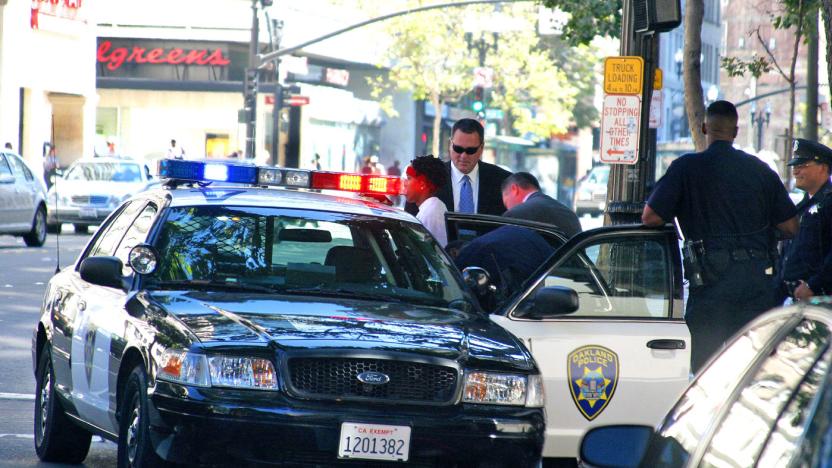
Big data shows racial bias in police behavior
Stanford University just delivered further proof that massive, readily available data sets can solve tricky law enforcement problems. School researchers combing through a mix of 28,119 Oakland Police Department stop reports, officer body camera footage and community surveys have learned that there are "significant" racial biases at play. OPD officers are not only more likely to stop a black person, but far more likely to conduct searches of black people, even though they weren't any more likely to find something incriminating. Officers more frequently handcuffed black people without arresting them, too. And the pattern is the same regardless of the crime rate in a given region.

NYPD's smartphone program is shortening crime response times
The NYPD Mobility Initiative is paying off in spades for Gotham's police. The force's Deputy Commissioner for Information Technology Jessica Tisch recently revealed that thanks to the initiative that puts smartphones and tablets in police hands, response times to crimes in progress are down 12.6 percent. Gotham's 36,000 officers are able to arrive at crimes in progress within 4 minutes and 26 seconds. According to a report by the New York Daily News, that's the lowest the responses have been in more than half a decade. That expediency extends to 911 call responses as well. With a dedicated app, the police are able to start moving toward a crime scene before a dispatcher even contacts them.

Court says police don't need warrants for phone location data
You would think that police would require a warrant to get your phone's location info, right? Not according to the US' Fourth Circuit Court of Appeals. It just ruled that asking a company for cellphone location data you've offered to a third-party doesn't represent a search under the Constitution's Fourth Amendment, and thus doesn't need a warrant. According to the judges voting for the decision, volunteering your position info means you've given up a "reasonable expectation of privacy" -- if you didn't want to share where you were, you wouldn't have handed that knowledge over to someone else, would you?

Geek Squad employee allegedly searched PCs for the FBI
An astute PC technician is supposed to report any illegal content they see while fixing a machine, but one employee of Best Buy's Geek Squad might have gone too far. The defense in a child pornography case alleges that the FBI paid Geek Squad agent Justin Meade to search customers' computers for illegal material, bypassing the warrant the FBI would need to conduct its own searches. A secret informant file supposedly shows that Meade was considered a source for child porn investigations between 2009 and 2012, leading to the bust in question. Attorneys for the accused, Dr. Mark Rettenmaier, want the evidence tossed out as a result.

Manchester police to give thousands of officers body cams
After conducting a prolonged, small-scale trial of body-worn cameras, Greater Manchester Police has announced plans to equip roughly 3,000 officers with the gizmos before the end of the year. The first new devices recently joined the 80-odd already in circulation, with more frontline officers including local Bobbies, special response units and Manchester Airport police to receive theirs over the coming months. The force expects having more cameras in the field will improve evidence gathering, as well as increasing public confidence in the officers wearing them.

Cops hacked the iPhone owned by 'Shield' actor's murdered wife
It might not have gotten the same amount of press as the San Bernardino case, but authorities also hacked into the iPhone of Michael Jace's wife with the help of an outside party. According to the court documents obtained by LA Times, the Los Angeles Police District has been trying to get into April Jace's iPhone 5s since 2015. Michael Jace (Julien Lowe from The Shield) is accused of killing April, and investigators believe they argued via text before she was murdered.






